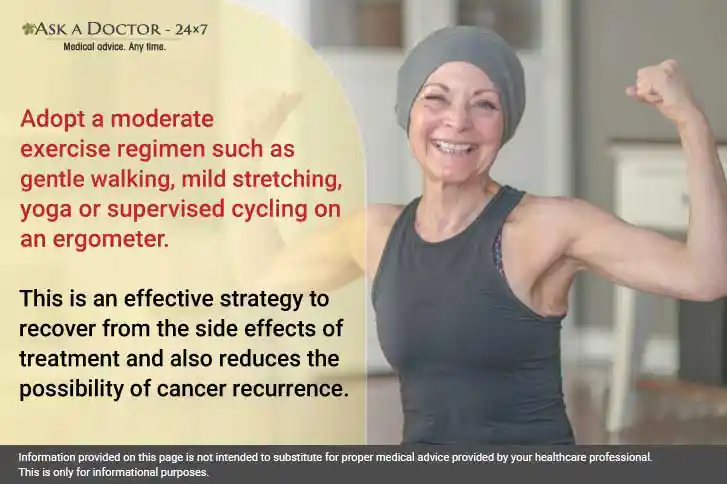7 Things You Can Do To Prevent A Breast Cancer Relapse
The biggest fear of any female who has undergone breast cancer treatment is that it may come back. The agony and anxiety one might have experienced, since the day cancer was diagnosed to the completion of therapies may appear as a nightmare, and getting it once again may sound heart-breaking. If unfortunately you have also gone through this distress and are worried about breast cancer recurrence, this blog may help you to know the things you must do to avoid the remittance of breast cancer. Although your doctor will give you tons of advice as post-treatment precautions, once you are discharged from the hospital, still there are a few simple things you must not ignore at all to reduce the chances of cancer striking back.
Follow these 7 tips to prevent breast cancer relapse

1. Stay physically active
Side effects of cancer treatment may leave you physically and emotionally fragile and you may experience fatigue after taking up your therapies. But it is recommended that you start with moderate exercise as soon as you are able to return to your daily schedule. Studies suggest that staying physically active promotes the quality of life for cancer patients by improving their mental health, increasing cardiorespiratory fitness, strengthening the muscles, and reducing the impact of treatment-related adverse events.
2. Don’t ignore follow-up care
First and the most important thing to remember is to take regular post-treatment follow-ups. Do not ignore health screenings, mammography, or diagnostic tests you are advised to take even if your treatment is finished. This helps to rule out missing any cancerous tissue from re-emerging. The cancer has the highest risk of reappearing within 2 years of treatment. So, meet your healthcare provider frequently during this period and also stay cautious about noticing any abnormal symptoms or any other side effects of the treatment.
3. Take medication as prescribed
Usually, breast cancer treatment continues even after the surgery, radiation, or chemotherapy is over. Your provider may recommend some anticancer drugs to be taken for a long to control the cancerous cells that might have been missed by cancer treatment. These life–extending drugs are essential as they are known to reduce the risk of cancer recurrence in breast cancer survivors. Follow your healthcare provider's instructions on taking your medicines timely. Remember, missing any medicine could lead to adverse consequences. Don’t change your medicines abruptly without consulting your doctor.
4. Monitor for signs and symptoms of recurrence
Regular breast self-examination is essential to increase the possibility of finding any new lump, thickening, knot, or any other abnormal breast change after the treatment is over. One must do it at least monthly, as this surveillance is as important as regular clinic visits to a doctor. Early detection of any abnormalities may prevent severe complications later. Ask your doctor to learn about the correct technique for examining the breasts.
5. Quit smoking or alcohol
You are advised to quit smoking or alcohol consumption before your cancer treatment starts. Don’t think you can start with it once the treatment is over. Smoking or alcohol consumption may aggravate the side effects of the cancer treatment besides increasing the chances of cancer to come back.
6. Take a balanced diet
A balanced diet is another parameter for creating a healthy lifestyle. Besides it also helps to overcome the side effects of cancer treatment like reduced bone density. Although diet is not directly linked to increasing or decreasing the possibility of cancer recurrence, a balanced diet still helps maintain a healthy body weight. This prevents the chances of obesity which may trigger multiple health concerns including late post-treatment recovery and breast cancer reoccurrence. Research studies suggest that women who are overweight or have a higher body mass index are at increased risk of breast cancer relapse.
7. Ask for cancer treatment and survivorship plan
You must maintain a proper summary of the course of treatment that includes diagnosis, diagnostic and pathology test reports, mammograms, screening records, therapy details, admission records, etc. This will help to get immediate treatment if your doctor notices any signs of cancer recurrence and also will rule out any ignorance in case you need to change your doctor. Always ask your doctor for a survivorship plan that consists of check-up schedules or follow-up tests, screening tests plan for other cancers, the long-term side effects from treatment, recommended diet and lifestyle changes, etc.
Breast cancer is certainly hard to deal with and so is managing the fear for it to come back. You must follow all the advice and recommendations from your doctor that help to reduce the chances of breast cancer relapse or to make early detection of its recurrence. Every woman who has been treated for breast cancer has some risk of its recurrence, however, this risk remains low, and not all patients experience breast cancer relapse. It depends on the cancer type, stage, treatment plan, patient’s health state, and various other factors. It’s normal to feel anxious about disease recurrence, but you need to overcome this fear for a complete sense of well-being.
Talk to our expert Oncologist if you have any queries regarding breast cancer recurrence or if you are unable to cope with the anxiety related to it.
Recently Answered Questions Related to Breast Cancer
- What Causes Pain In the Breast?
- Noticed An Indentation On Breast. Have a Family History Of Breast Cancer. Chances?
- What Causes Visible Vein In Swollen Left Breast And Rash Below Nipple?
- Suggest Treatment For Red Spots On The Left Breast
- Could A Woman Get Breast Cancer If You Hit Her Breast?
- Suggest Treatment For the Presence Of Cyst On The Breast
- What Are The Causes, Symptoms, Risks And Prevention Of Breast Cancer?
- Can A Breast Cyst Turn Cancerous?
- I Have Breast Implants And I Am Pregnant
- What Are The Side Effects Of Birth Control Pills?
Disclaimer: Information provided on this page is not intended to substitute for proper medical advice provided by your healthcare professional. This is only for informational purposes.
Ask a Specialist
Recent Questions


